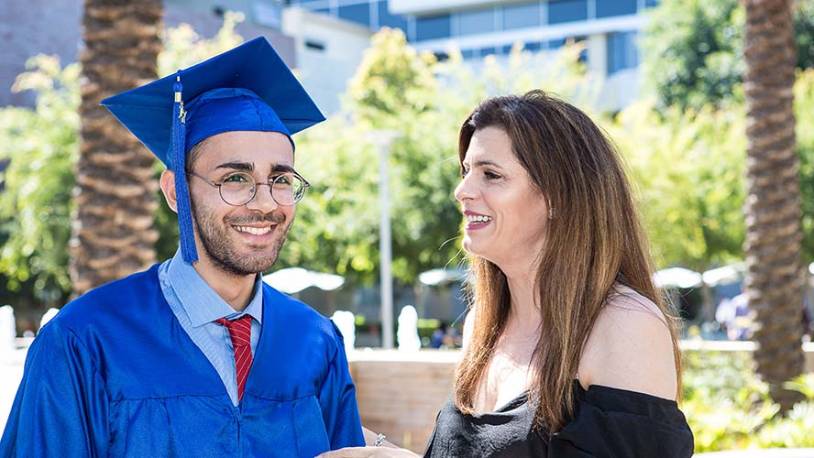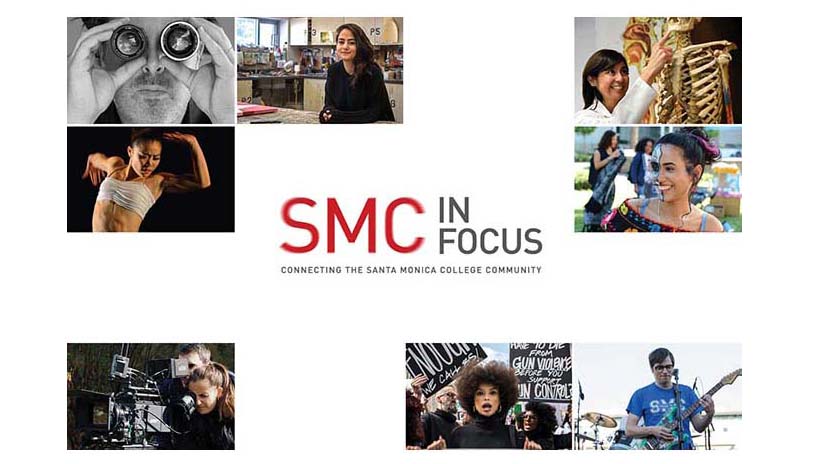
At age 14, John Abughattas became severely ill with ulcerative colitis, a disease that inflames the inner lining of the large intestine. The chronic pain prevented him from attending classes, so he accepted weekly packets of homework, determined not to let his illness impede him. Despite being set apart from his fellow students and with limited support from his teachers, he still graduated.
John’s lonely path of learning brought him to Santa Monica College. The first place he went was the SMC Center for Students with Disabilities, “where the kindest people on campus helped me figure out a way to make college work with my condition,” he said. He finally felt part of a community.
He majored in philosophy, pursuing answers to the existential questions that had haunted him since his colitis began. He also made time to volunteer, even though balancing his condition with his classes was sometimes a challenge. He worked with Junior State of America, which promotes civic discourse, and became a COPE Health Scholar, helping patients at the California Hospital Medical Center. He also served as president of the SMC Philosophy Club.
John - accepted at UCLA, UC Berkeley, and Columbia University - finally settled on UCLA, where he will major in philosophy. He graduated from SMC with an Associate degree in General Science; he was selected - after an audition process - to deliver the “student challenge” at the college’s 87th annual commencement on June 13, 2017. A transcript of the inspiring speech John delivered to hundreds of fellow - graduates, faculty, staff and guests follows:
President Jeffery, Board of Trustees, Faculty, Staff, my Fellow Graduates and Mom.
I hope to live a life full of naive optimism, and I can only hope that you choose to do the same. I am here today on a mission. A mission to make this more than just another commencement speech. More than than just routine life lived unexamined and uninspired. We have one short life and full control over what to do with it. So why settle for the mundane? Those of us here today have decided to dedicate many years of our lives to education. But what is this education for? I believe its purpose is twofold: to prepare us to be remarkable people and to enable us to come to the defense of the less privileged.
First, we should strive to be great. It was my favorite philosopher, Aristotle, who said “We are what we repeatedly do. Excellence, then, is not an act but a habit.” I learned that firsthand when I became chronically ill in my early adolescence and was forced to spend all of high school at home on independent study. No teacher was there pushing me to succeed academically or there to guide me, so I had to take matters into my own hands or become a victim of an educational system that failed to accommodate highly driven disabled students. The assumption too many people make is that disabled means incapable. That was and is not good enough for me. I, like all of you, am responsible for myself, I can make decisions and take actions that do not just sustain my life, but that make my life one of wonder and purpose.
My challenge to you is that no matter what your circumstances, no matter where you are going next: strive to be excellent. Recognize that you can be better than “good enough.” The role models we want to be like are the people who never settled. Reject mediocrity in all of its forms. Complacency is a virus that will attempt to steal the passion you have in you. Within you might be the world’s greatest flute player, a Pulitzer Prize winning poet, a gold medalist wrestler, a paradigm shifting philosopher, or a biochemist with a cure for cancer. You just have to let that person out. But once you have drunk up the sea and unchained the earth from the sun, I beg you to not forget about those others who never had the chance to sit where you are sitting today.
Lady Liberty reminds us that we have a duty to the tired, to the poor, to the huddled masses yearning to breathe freely. Whether those masses be our neighbors or strangers, I believe we should recognize the value in their humanity and work to empower them. One month ago in Portland, Oregon, three men Taliesin Myrddin Namkai Meche, Ricky John Best, and Micah David-Cole Fletcher stepped in to prevent another man from harassing a teenage girl for being Muslim. They exemplified the best of what humans are capable of by standing up for justice in the name of a stranger.
Like many of my fellow graduates, I am not certain what it is I will do with this life of mine. But of all the possibilities that may lay ahead, I would find no greater or more noble a life than one lived in the service of others. Make your education worth something more than just your personal benefit. We all want to take care of ourselves, and we should. But when our needs and simpler wants are met, if we wish to say that we have lived virtuous lives, we must turn our sights to the needs of our brothers and sisters. Those are the values I learned here at SMC. Where it was in my philosophy classes where Professor Amber Katherine pushed me to clarify what it is I find important. It is the excellence I have learned during my independent study with Professor Paul Klumpe who pushed me beyond what a lower division education normally demands.
So here we are, at the beginning of the next stage. Embrace and affirm all that life has to offer. Do something profound. Do something worth writing about. Make people remember you after you’re gone. Get your name in a textbook. Be a work of art. Live boldly. Let social norms be damned. Volunteer, reach out, support, and enrich the lives of those around you. Embrace the absurdity of it all.
Thank you.
* * *



